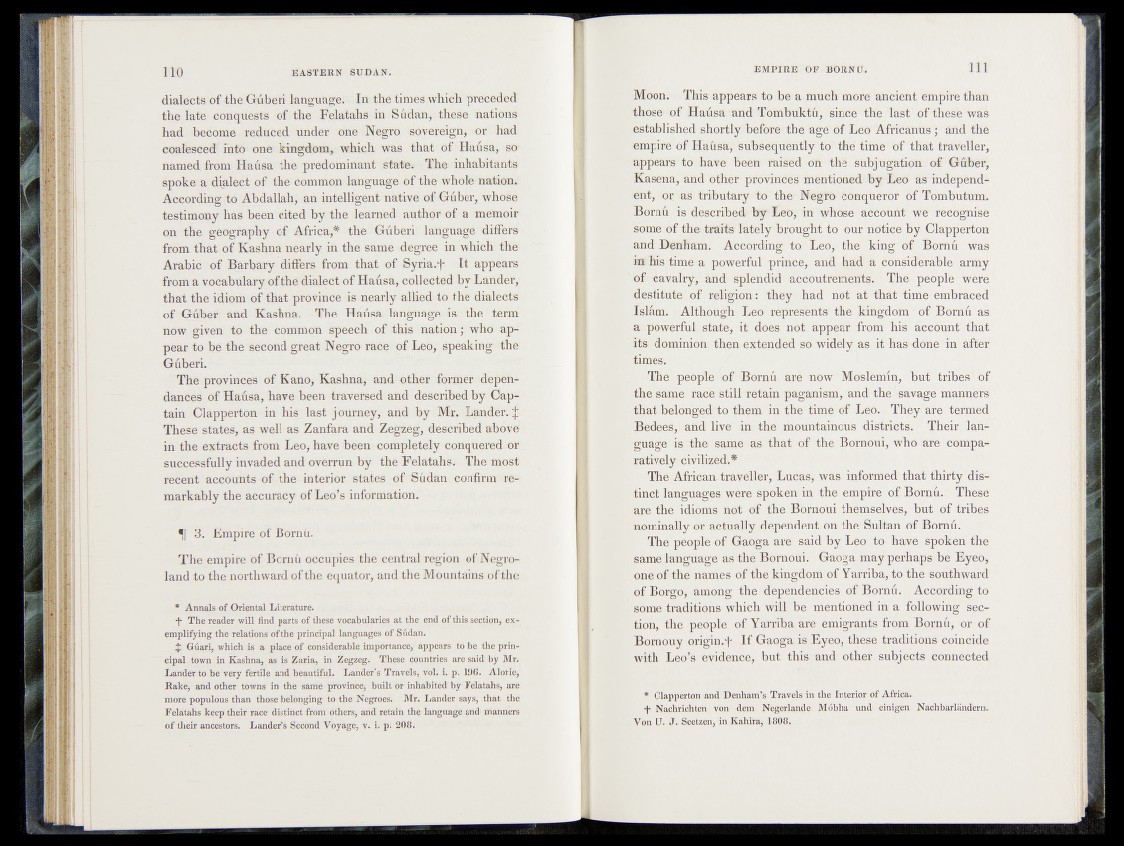
dialects of the Guberi languages - Ifithe times which preceded'
the late conquests of the Eelatahs in S ûdan,: these nations
had become reduced under one Negro soveteigö> or had
coalesced into one kingdom, which was that of Haûsa, so-
named; from llausa the predominant state. The inhabitants
spoke a dialect of the common language of the whole nation.
According to Abdallah, an intelligent native of Gûber, whose
testimony has been cited by the learned author- of a memoir
on the geography of Africa/* the Guberi language differs
from that of Kashna nearly in the same degree in which the
Arabic of Barbary differs from that of Syria.f’ It appears
from a vocabulary of the dialect of Haûsa, collected by Landeîy
that the idiom of that province is nearly allied to the dialects
of Gûber and Kashna. The Haûsa language is the term
now given to the common speech of this nation ; who appear
to be the second great Negro race of Leo, speaking
GûberL
The provinces of Kano, Kashna, and -other former dépendances
of Haûsa, have been traversed and described by Gap^
tain Clapperton in his last journey, and by Mr. Lander, j
These states, as well as Zanfara and Zegzeg, described above
in the extracts from Leo, have been completely conquered or
successfully invaded and overrun by the Felatahs. The Most
recent accounts of the interior states of Sudan confirm re-:
markably the accuracy of Leo’s information.
5[ 3. Empire of Bornu,
The empire of Bornu occupies the central region of Negro-
land to thenorthward of the equator, and the Mountains of the
• Annals of Oriental Literature.
-f- The reader will find parts of these vocabularies at the end of this section, exemplifying
the relations of the principal languages of Sûdan.
%, Güari, which is a place of considerable importance, appears to be the prin-
" cipal town in Kashna, as is Zaria, in Zegzeg. These countries are said by Mr.
Lander to be very fertile and beautiful. Lander's Travels, vol. i. p. 196. Alotlé,'
Rake, and other towns in the same province, built or inhabited by Felatahs, are
more populous than those belonging to the Negroes. Mr. Lander says, that the
Felatahs keep their race distinct from others, and retain the language and manners
of their ancestors. Lander’s Second Voyage, v. i. p. 208.
Moon. This appears to be a muchmore ariciettt empire than
those of HausOrand Tombuktu, êiritóe the last of theSbwaS
estabB|hed’ shortly'bêföfe< the Agéj of $tóè 'AfricanUs ; and thé
empire of HaUsa, subsequently to the time* *0f" that traveler,
appears to havé been raised on thè Sübjbg&tion, of Gdber,
Kasena, and other' pfovinces mentioned by Leo ihdepèftd*
nnt, -bi-aS tributary to the •Negto‘;&taqtterbr dfTombutum.
Bornu is described by Leo, in we redognise
some of the traits lately brought to' óurM^Éed by ^Clapperton
and Denham. According the king of Bornu was
in his time a powerful prince, and bad p^dfoSid^aMfe army
of cavalry, and splendid 'afe^iïtremeiïts. The* pewl^pVerè
destitute of religion: they had not at that time embraced
Islam. ; Although' Leo^ represents the kingdom ^ Of/Borbu as
a powerful state, it does not appear from his* account' that
its dominion then extended so widely as it has-dOn^ln' after
times.
The people of Bornu aré now Moslemin, but trilidlVOf
the salm:e; race still retain paganism, and the 'savagé manners
that belonged to them in thè time of Leo. They* ah- t< nm d
Bedees, and live in the mountainous districts. Thoir/;lan-
guage is the same as that of the Bornoui, who are comparatively
civilized.*
The African traveller, Lucas, was informed that thirty distinct
languages were spoken in the empire of, Bornu. These
are the idioms not of the Bornoui themselves, but of tribes
nominally or actually dependent on the Sultan of Bornu.
The people of GaOga are said by Leo to have spoken the
same language as the Bornoui. Gaoga may perhaps be Eyfeb,
one of the names of the kingdom of Yarriba, to the southward
of Borgo, among the dependencies of Bornu. According to
some traditions which will be mentioned in a following s e c r
tion, the people of Yarriba are emigrants from Bornu, or of
Bornouy origin.f If Gaoga is Eyeo, these traditions coincide
with Leo’s evidence, but this and othefr subjects connected
* Clapperton and Denham’s Travels in ühe Interior of Africa.
+ Nachrichten von dem Negerlande Möbha und einigen Nachbarländern.
Von U. J. Seetzen, in Kahira, 1808.